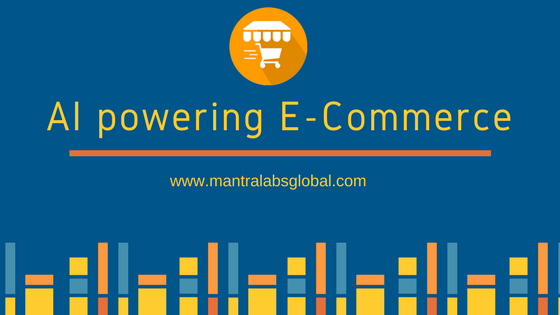Artificial Intelligence [AI] is reshaping the e-commerce sector by eliminating many manual processes in the area of promotion, supply chain, and assortments. AI has been a helping hand by making decisions smarter, accurate and real time. The agile, data-driven technology advanced industry could get a boost with the adoption of AI into the system. Identifying patterns, sourcing data from different channels, facial recognition, shopping patterns, media trends and automation of mundane jobs would make e-commerce industry more dynamic, and customer focussed.
Industry expert Gartner predicts – by 2020, 85% of the customer relationship, would be managed without human interaction.
So what are key areas where AI has been hitting hard and providing positive outcomes, let’s explore :-
Offering customer focussed Solution
The critical requirement of any business is “serving the customer needs.” However, with digitization its hard to know them, study their body language or communicate with them. That’s where Artificial Intelligence [AI] comes into the picture. With the help of machine learning and natural language processing, it gets easy to read the movements of the customer, analyze and show them relevant items. One of the best examples is of Pinterest that offers a browser extension and shows similar images with image recognition software. What it helps is narrowing down the search for the user with ease and convenience.
Realigning Sales Strategy
Thanks to software industry we have best in class Sales and marketing Management system and
CRM, but studies have shown that almost 30% of leads are not followed up by the sales team. The system is not equipped to predict or read market sentiments and most importantly realign sales messages in real time. For all of this embedding natural language learning, predictive marketing and analyzing deeply onto the leads would help in realigning sales strategy, thereby empowering speedy resolutions and positive growth for the company.
Bots in touch always
Do you recollect Air India Maharaja Logo? How much warmth it had? Wouldn’t you like to offer your client base the same feeling? A similar experience when they enter your digital store they are greeted with a smile quickly navigated to the section of their choice and offered exactly what they are looking for – be it a product, query resolution, returns or offers. Thanks to chatbots – the computer program that could communicate with human users digitally. Integration of chatbot with social media or shopping cart could be beneficial for the e-commerce industry. A customer could get quick answers to the items added to the shopping cart, be it about warranty details or return policies. Also coupling it with social media like Facebook could help the customer in a situation like payment has been processed but a confirmation email/message was not seen. Chatbots are empowering the e-commerce business with a possibility of real-time interaction and enhancing the customer experience.
Expand Services with IoTs integration
For all the digital stores it’s like a dream come true when conditions like these turn into reality. The smart refrigerator issues a command that eggs are out of stock and need to be replenished places an order with a weekly grocery list to your favorite online grocery store, or the Bose speaker that automatically renews the subscription of amazon prime music. With seamless integration with smart devices, AI could help in building a strong and loyal customer base.
AI is reshaping the online retailers and e-commerce marketing. With brands like Walmart, Amazon and eBay have been at fore frontiers in leveraging the latest technology; the start-ups are now investing in enhancing the productivity of the firm. So experience the AI and take your e-commerce business to the next level.
Knowledge thats worth delivered in your inbox






